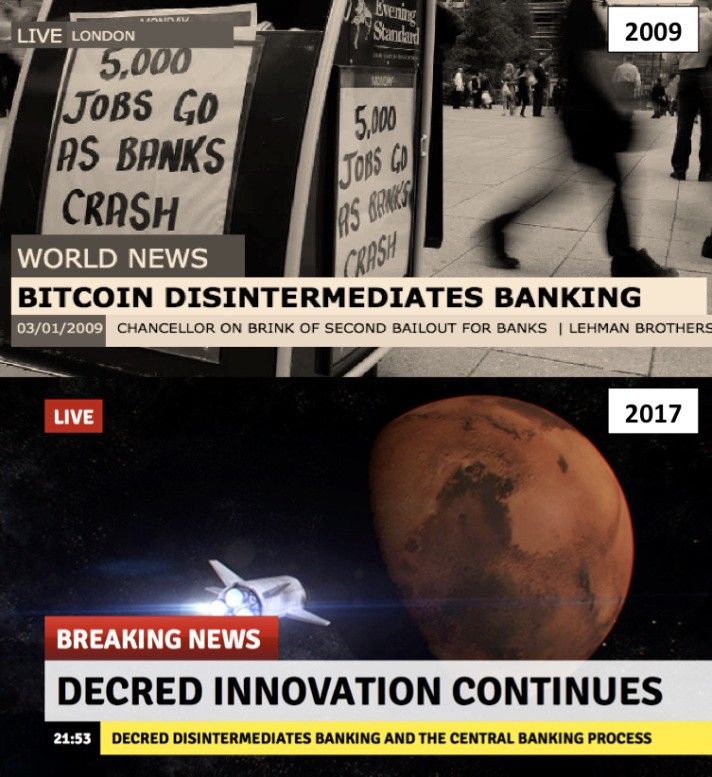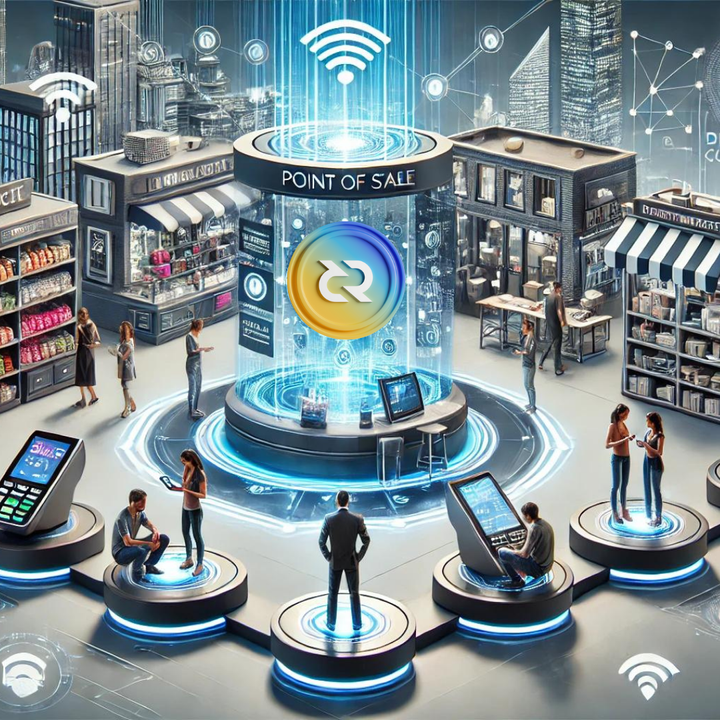Decred Disintermediates Banking AND the Central Banking Process!
The cryptocurrency revolution started in 2009 when Bitcoin first introduced its peer-to-peer electronic cash system. It was the first decentralized network to offer people a secure and convenient way to disintermediate both the storage and transmission of value.

The Decred Digest - Jun 25, 2017

The cryptocurrency revolution started in 2009 when Bitcoin first introduced its peer-to-peer electronic cash system. It was the first decentralized network to offer people a secure and convenient way to disintermediate both the storage and transmission of value. In other words, if you hold your own private key you can securely store Bitcoin in a wallet, or send it to a friend without the involvement of a third party. Unlike fiat currencies that are subject to government decisions and the control of banks, cryptocurrencies have no central point of failure, and there is no central authority that can tinker with the monetary system — is there?
It’s clear that Bitcoin has done a good job of disintermediating the storage and transmission of value, or what we know today as ‘banking’. However, while the Bitcoin network is decentralized, its decision making process is not. Bitcoin has no governance system that allows its users to voice their opinion on decisions that will effect the network — their bank and their value. We now know this creates a number of problems.
At around three transactions per second the Bitcoin network has become congested, and this month the average fee for each of these transactions has reached a high of $5.50. Transactions are now slow and costly. If cryptocurrency really is going to disintermediate banking and remain an efficient method of transmitting value this just won’t do.
For the last three years all efforts to resolve this issue and scale Bitcoin have been unsuccessful. Not because the technology to make sufficient improvements is unavailable, but because there is no governance system in place to allow the decision makers for the Bitcoin network to reach an agreement.
Bitcoin’s decision makers are development teams, miners, and companies such as merchants and exchanges. As I have mentioned in a previous post; Bitcoin companies (https://coin.dance/poli), and mining pools (https://coin.dance/blocks) signal their support for specific Bitcoin Improvement Proposals (BIP) put forward by development teams — notably Bitcoin Core or Bitcoin Unlimited. The best option currently available for users to voice their opinion is to run a full node in support of a BIP. However, for many users around the world this is simply not possible. Some people just don’t have the computing capacity, resources or technical ability to run a full node.
I think it’s fair to make the assumption that the vast majority of Bitcoin users want both cheaper and faster transactions. But without an effective governance system in place to give users a say in the decision making process, it leaves them completely reliant upon the centralized authorities described above to make decisions on their behalf (a somewhat ineffective Bitcoin central bank). However, as with decisions made by central banks around the world, these decisions might not always represent the wishes of the people. In contrast, decisions may be self-serving, and therefore they might not be made with the best interests of users in mind. For example, some Bitcoin miners are reluctant to implement second layer scalability solutions, due to fears it will reduce the amount of fees they earn from on-chain transactions. As a consequence, Bitcoin users now have to pay a higher fee to wait for a longer period of time for their transactions to be confirmed. What happens when we arrive at the next hurdle?
Decred’s decentralized governance system solves this problem. Not only does it disintermediate banking, it goes one step further and disintermediates the central banking process too. Decred’s hybrid proof-of-work/proof-of-stake governance system allows stakeholders to collectively make decisions regarding any changes to the Decred network via an on-chain vote. This therefore removes third parties from the ‘central bank’ decision-making process needed to govern the storage and transmission of value.
In my opinion an effective governance system is now proving to be the most vital feature of a blockchain. Governance is necessary to enable users to fully participate in decision-making. It prevents chain splits (as seen with Ethereum), and political deadlock (as seen with Bitcoin).
Decreds decentralized governance system is enabling it to rapidly adapt, evolve, and progress. As a consequence, I believe Decred is now beginning to separate itself from the rest of the pack. With the number of new features planned on the 2017 roadmap, and the current rate of development, I only see the gap getting bigger.
Furthermore, with the recent integration of Decred on Exodus it has never been easier to store and transmit value on the Decred network! And since stakeholders have also voted to integrate the Lightning Network, those transmissions will soon be even cheaper and faster!
Be your own bank. Be your own central bank. Join the Decred community!
K.
P. S. Why not try and solve the new Decred ‘Exodus’ puzzle — with a prize of approximately $6000 up for grabs! Visit https://www.exodus.io/decred/for details and the Decred #puzzles Slack channel to join in!





Comments ()